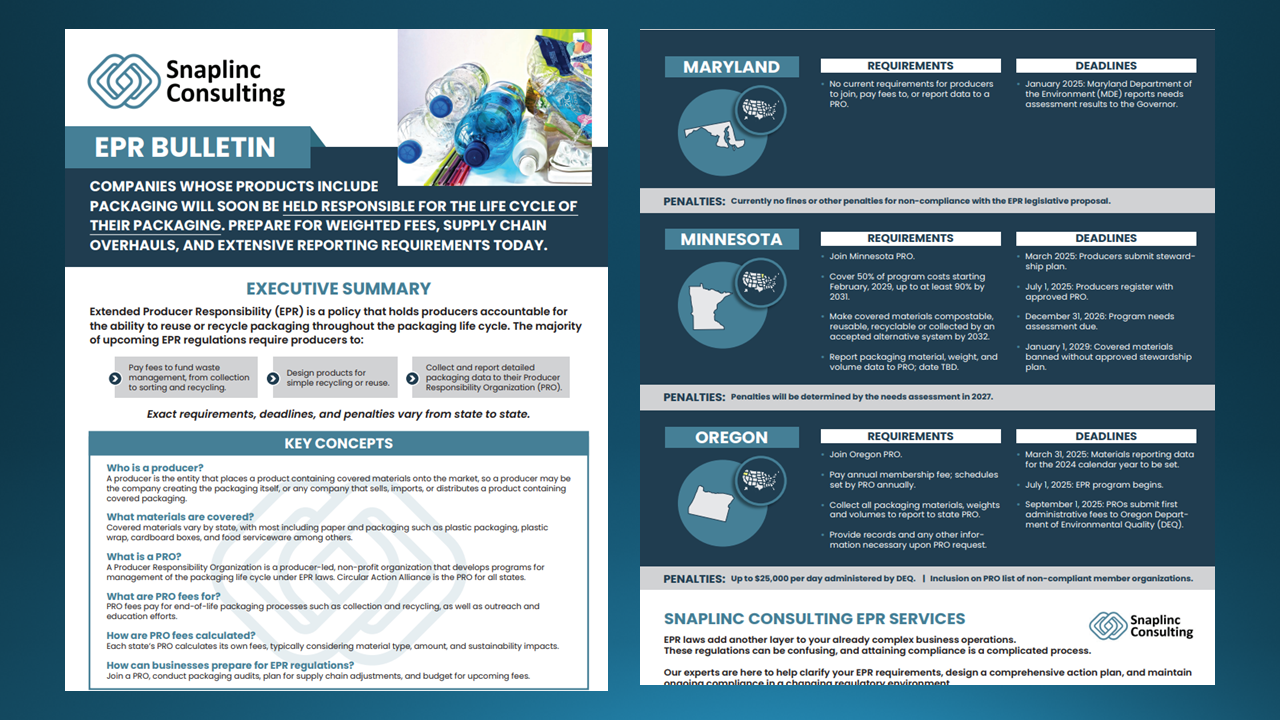EPR Deep Dive: Washington
Background
The Recycling Reform Act was introduced to address Washington's inadequate recycling rates and the increasing burden of packaging waste on municipalities and consumers. Despite a goal set in 1989 to achieve a 50% recycling rate, the state's waste recovery rate has remained flat since 2011 . The new law aims to overhaul the recycling system by holding producers accountable for the lifecycle of their packaging materials, and was signed into law on May 17, 2025.
Download our EPR bulletin for more essential information.
What Companies Are Affected?
Washington’s EPR program applies to producers of packaging and paper products sold in Washington State. This includes manufacturers, brand owners, importers of record, and distributors. Covered entities include brand owners, importers, and distributors in addition to manufacturers. The EPR law affects companies in nearly every sector, including:
Food and beverage
Consumer packaged goods (CPG)
Personal care and household products
E-commerce and retail
Publishing and print
The materials covered include:
Packaging: Materials to transport, market, protect, or handle a product.
Food packaging: Materials to market, protect, handle, deliver, serve, contain, or store food and beverages.
Paper products: Products made from wood or cellulosic fibers.
However, "de minimis" producers are exempt if they meet any of the following criteria in the prior fiscal year:
Introduce less than one ton of covered material into the state.
Earn under $5 million in global revenue.
Meet a tailored agricultural threshold (to be determined).
These exemptions align with similar thresholds in states like Colorado and Oregon.
Key WA EPR Deadlines
WA producers must be aware of the following dates to remain compliant with Washington’s EPR laws.
March 1, 2026: Producer Responsibility Organizations (PROs) must register with the Washington Department of Ecology.
July 1, 2026: Producers must join a PRO or register individually to manage recycling, compliance, and reporting responsibilities.
December 31, 2027: The Department of Ecology is required to conduct and submit a statewide recycling needs assessment, with updates every five years thereafter.
March 1, 2029: Producers may not introduce covered materials into the state without being registered with a PRO.
January 1, 2030: The program will go into full effect, and producers must cover 50% of recycling costs.
January 1, 2031: Producers must cover 75% of recycling costs.
January 1, 2032: Producers must cover 90% of recycling costs.
After these deadlines, the state will continue to perform needs assessments that will alter fee schedules and requirements based on findings about the program’s effectiveness.
WA EPR Noncompliance Penalties
Failure to comply with the EPR requirements can result in substantial penalties:
Civil Penalties: Up to $1,000 per violation per day.
Repeat Violations: Penalties increase to $10,000 per violation per day for repeat offenses.
Continued Noncompliance: Additional penalties may be imposed for ongoing sales of noncompliant products after warnings.
These penalties can quickly add up, especially if your EPR tools aren’t capable of quick scaling and adaptation to bring your company back in alignment after the initial reporting push.
WA EPR Best Practices
To navigate the new EPR landscape effectively, companies should consider the following best practices:
Early Engagement: Begin assessing your packaging materials and supply chain to identify areas needing adjustment.
Join or Form a PRO: Collaborate with industry peers to establish or join a Producer Responsibility Organization that can manage compliance collectively.
Stay Informed: Keep abreast of updates from the Washington Department of Ecology regarding program requirements and deadlines.
Invest in Sustainable Packaging: Explore opportunities to redesign packaging for recyclability and reduced environmental impact.
Consult Experts: Engage with legal and environmental consultants specializing in EPR to ensure full compliance and to leverage potential benefits.
Other EPR Deep Dives
California | Colorado | Maine | Minnesota | Oregon
Washington Washington EPR Expertise From Snaplinc Consulting
There’s plenty of time to get ready for Washington’s EPR requirements, but turning it into an opportunity for improved operations takes a fine-tuned strategic approach. Our experience with EPR initiatives in the United States offers companies like yours a proven toolkit that can help minimize PRO fees and maintain compliance. With assistance from our experts and a scalable toolkit, you’ll be able to stay ahead of regulatory requirements and support EPR needs of your growing business. Get in touch today to discuss your EPR needs.
Frequently Asked Questions
Q: Does Washington’s EPR program address reuse and refill infrastructure?
A: Yes. To help producers transition to reuse/refill packaging materials, CAA will fund a grant program of at least $5 million to support implementation.
Q: Does Washington have EPR exemptions?
A: Yes. Producers are exempt from EPR requirements if they introduce less than 1 ton of covered packaging and have a global revenue under $5 million per year. There are also exemptions for hazardous materials packaging, medical product packaging, and materials that demonstrate a recycling rate of 65% for three consecutive years.
Q: Do producers have to pay for expanding recycling access?
A: Part of Washington’s EPR law requires expansion of recycling services, which producers pay for indirectly through PRO fees.


